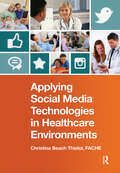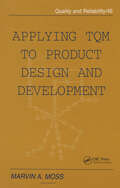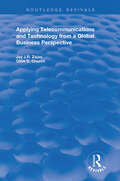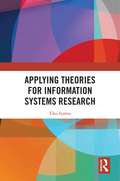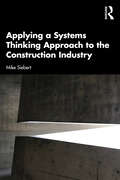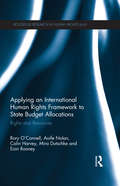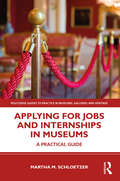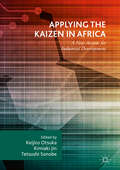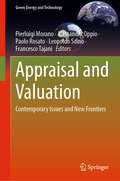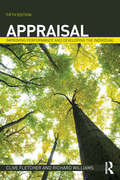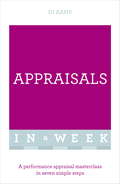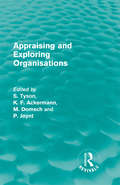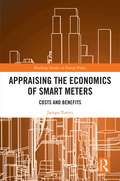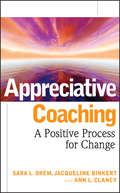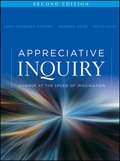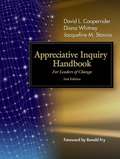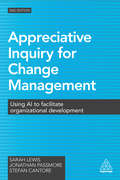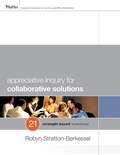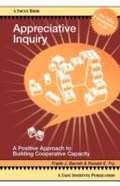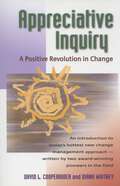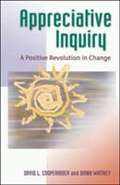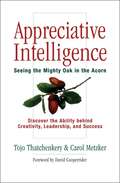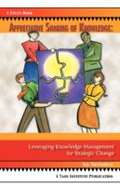- Table View
- List View
Applying Social Media Technologies in Healthcare Environments (HIMSS Book Series)
by Christina Beach ThielstApplying Social Media Technologies in Healthcare Environments provides an indispensable overview of successful use of the latest innovations in the healthcare provider-patient relationship. As professionals realize that success in the business of healthcare requires incorporation of the tools of social media into all aspects of their worlds and recognize the value offered by the numerous media channels, this compendium of case studies from various voices in the field-caregivers, administrators, marketers, patients, lawyers, clinicians, and healthcare information specialists-will serve as a valuable resource for novices as well as experienced communicators. Written by experienced players in the healthcare social media space and edited with the eye of an administrator, chapters provide insight into the motivation, planning, execution, and evaluation of a range of innovative social media activities. Complete with checklists, tips, and screenshots that demonstrate proven application of various social channels in a range of situations, this will be a valuable tool to maximize opportunities in meeting the challenges of new healthcare demands.
Applying TQM to Product Design and Development (Quality and Reliability)
by Marvin Moss"Comprehensively covers all phases of the application of Total Quality Management (TQM) to product design and development--from initial concept to customer support--addressing statistical quality control, manufacturing engineering, processes and procedures management, and motivation management. Provides rigorous definitions of the principles of TQM."
Applying Telecommunications and Technology from a Global Business Perspective
by Jay J. ZajasAn exploration of the changes and developments in telecommunications over a span of fifty years by a business person and then Professor Emeritus, reflecting on the many changes that have taken place from when the word " telecommunications" did not exist. Two decades ago, his life in academia included no personal computer or any other desk in the Business Administration Department, and when the first fax machine came, it was hard to believe that a perfect copy of a proposed paper could be received by a long time co-author in Turku, Finland in minutes. First published in 1997, when e-mail and the Internet were still new to most people on campus.
Applying Theories for Information Systems Research
by Tiko IyamuThis book sets out to provide postgraduate researchers with guidance on selecting and applying sociotechnical theories to the study of information systems, including how they can be combined to complement each other. Until now it has been difficult to source advice on the application of these theories, and there has been no single book that combines multiple theories as this does. Examining the impacts of technological developments and seeking to understand how humans interact with computers and systems is a dynamic field but can often confuse researchers with the overwhelming number of social theories that are utilised to derive insights. Instead, the author in this book breaks down some of the most popular theories used to underpin information system research, such as activity theory (AT), actor-network theory (ANT), contingency theory (CT), diffusion of innovation (DOI) theory, structuration theory (ST), and the technology acceptance model (TAM). By doing so, this book serves to enable a simpler, faster selection of appropriate theories, and a more effective and productive application that leads to richer, more rigorous research outcomes. Written for postgraduates, researchers, and academics in the fields of information technology and information systems, this book provides a valuable resource of sociotechnical research methodologies that will enable and enhance future studies.
Applying a Systems Thinking Approach to the Construction Industry
by Michael SiebertThis book aims to shed light on why it is that so many well-meaning initiatives and government white papers have failed to have the expected impact in transforming the UK construction industry. Using the UK housing sector as a case study, Mike Siebert applies a Systems Thinking approach to tackling some of the shared 'Wicked Problems' faced by an industry that urgently needs to boost its productivity levels, build more sustainably and affordably, and generally improve its working practices. In an accessible and easy to read style, Siebert challenges the overall decision making and problem-solving approach adopted by the industry and seeks to put Systems Thinking front and centre to consider the core issues from multiple perspectives. Initially outlining the key stakeholders and the drivers and barriers to change, he then introduces Systems Thinking and explains using numerous examples of known issues what this approach could achieve. His central aim is to show how, if a Systems Thinking approach were to be applied to the UK housing industry’s problems, many of them could be resolved to the benefit of all the parties involved – government, housebuilders, material suppliers, the warranty industry, the design industry and the end users. These are shared problems, and they require shared solutions, but without first understanding these complex problems from the perspectives of all parties that need to benefit from the solutions being proposed, it is unlikely that those solutions will achieve the level of engagement needed for them to successfully meet their objectives.
Applying an International Human Rights Framework to State Budget Allocations: Rights and Resources (Routledge Research in Human Rights Law)
by Colin Harvey Aoife Nolan Rory O'Connell Mira Dutschke Eoin RooneyHuman rights based budget analysis projects have emerged at a time when the United Nations has asserted the indivisibility of all human rights and attention is increasingly focused on the role of non-judicial bodies in promoting and protecting human rights. This book seeks to develop the human rights framework for such budget analyses, by exploring the international law obligations of the International Covenant on Economic, Social and Cultural Rights (ICESCR) in relation to budgetary processes. The book outlines international experiences and comparative practice in relation to economic and social rights budget analysis and budgeting. The book sets out an ICESCR-based methodology for analysing budget and resource allocations and focuses on the legal obligation imposed on state parties by article 2(1) of ICESCR to progressively realise economic and social rights to 'the maximum of available resources'. Taking Northern Ireland as a key case study, the book demonstrates and promotes the use of a ‘rights-based’ approach in budgetary decision-making. The book will be relevant to a global audience currently considering how to engage in the budget process from a human rights perspective. It will be of interest to students and researchers of international human rights law and public law, as well as economic and social rights advocacy and lobbying groups.
Applying for Jobs and Internships in Museums: A Practical Guide (Routledge Guides to Practice in Museums, Galleries and Heritage)
by Martha M. SchloetzerApplying for Jobs and Internships in Museums offers a straightforward approach to applying for positions within a museum. Martha M. Schloetzer provides practical advice about the application and interview process that will prepare emerging museum professionals as they approach the profession. From reviewing job and internship postings to developing a solid resume and writing distinctive cover letters, this guide provides practical, sound advice for museum job seekers. Schloetzer integrates the stories of successful and unsuccessful interns and job applicants throughout the book’s narrative, and recognizing the additional challenges faced by non-US nationals, the book also offers information specifically for international students seeking work experience in US museums. The insider information included in Applying for Jobs and Internships in Museums makes it a key resource for both a US and international audience interested in gaining museum experience in the US. It will be of particular interest to college-level and graduate school students, as well as recent graduates. The guide can also serve as a reference in the classroom, helping professors and instructors prepare students for the job search ahead.
Applying the Kaizen in Africa: A New Avenue for Industrial Development
by Keijiro Otsuka Tetsushi Sonobe Kimiaki JinAt present, how to develop industries is a burning issue in Africa, where population growth remains high and economic development has thus far failed to provide sufficient jobs for many, especially young people and women. The creation of productive jobs through industrial development ought to be a central issue in steering economic activity across the continent.The authors of this book, consisting of two development economists and five practitioners, argue that the adoption of Kaizen management practices, which originated in Japan and have become widely used by manufacturers in advanced and emerging economies, is decisively the most effective first step for industrial development in Africa.This open access book discusses what Kaizen management is, why it is applicable to Africa, and why it can provide Africa with a springboard for sustainable economic growth and employment generation.
Appraisal and Coaching: Improving Results with Feedback
by Richard LueckeThe first half of this chapter shows you how to handle a performance appraisal and offers eight steps for doing it right. The balance of the chapter explains how to improve performance through coaching. These two activities provide opportunities for both the manager and the subordinate to provide feedback to one another on what is working and what is not--feedback that is an essential element of management.
Appraisal and Valuation: Contemporary Issues and New Frontiers (Green Energy and Technology)
by Pierluigi Morano Alessandra Oppio Paolo Rosato Leopoldo Sdino Francesco TajaniThis book features a selection of the best papers presented at two recent conferences organized by the SIEV (Italian Society of Appraisal and Valuation). Taking into account the current need for evaluative skills in order to make effective and sustainable investments, it highlights the multidisciplinary role of valuation, which opens the door for interactions with other sectors, scientific and professional fields. The book collects twenty-two papers, divided into three parts (Territory & Urban Planning, Real Estate Assets & the Construction Building Process, Real Estate Finance & Property Management) that reflect the main issues of interest for future urban development policies, namely: feasibility analysis for investments; selecting which decision support models to apply in complex contexts; enhancement of public and private assets; evaluating the effects produced by territorial investments; valuation approaches to properties; risk assessment; and strategies for monitoring energy consumption and soil sealing.
Appraisal: Improving Performance and Developing the Individual
by Clive Fletcher Richard WilliamsIn this revised and updated text, Fletcher and Williams take an evidence-based approach to analysing the key elements of the appraisal process and its place in performance management. Drawing on the academic literature and examples of best-practice, the authors explain how performance appraisal can motivate and develop staff, foster commitment and positivity, and ultimately improve an organisation’s performance. Key topics covered include: Designing an appraisal system Identifying and developing talent Multi-level and multi-source feedback Appraising professionals Cultural challenges Evaluating and maintaining appraisal systems Appraisal: Improving Performance and Developing the Individual, 5th Edition, is a standard in the field and essential reading for all students of HRM and occupational psychology, and for any HRM professional looking to develop more effective performance appraisal systems.
Appraisals In A Week: A Performance Appraisal Masterclass In Seven Simple Steps
by Di KampEffective appraisals just got easierAppraisals are often seen as an isolated and time-consuming round of paperwork that everyone has to engage in and few see any point to. If we were to truly recognize the potential and intended value of appraisals, they would be regarded completely differently.The original intention of an appraisal system is to encourage and develop the staff of the organization, so that they all perform to their highest potential. Properly implemented and used, appraisals will help you, if you are a manager, to ensure that your staff are as effective as possible in their work, and thereby to make your area of work a powerful contributing factor to the success of the organization.Appraisals can also make your job as a manager easier, because they give you the opportunity and framework to encourage and develop your staff. This results in a team of people who feel valued and supported, and who know that their work makes a positive difference to the organization as a whole. As a manager, you can then spend less time and energy on pushing and controlling your team, and more time on the work that moves things forward and is more satisfying.By the end of the final chapter, you will see how appraisals can make a positive difference to youas a manager, your staff as individuals, and the organization as a whole. Sunday: Why appraise?Monday: Formulating a successful appraisalTuesday: The appraiser's role 1: setting the frameworkWednesday: The appraiser's role 2: attitudes and approachesThursday: The interview 1: reviewing achievementFriday: The interview 2: looking aheadSaturday: Completing the appraisal: after the interview
Appraisals In A Week: A Performance Appraisal Masterclass In Seven Simple Steps
by Di KampEffective appraisals just got easierAppraisals are often seen as an isolated and time-consuming round of paperwork that everyone has to engage in and few see any point to. If we were to truly recognize the potential and intended value of appraisals, they would be regarded completely differently.The original intention of an appraisal system is to encourage and develop the staff of the organization, so that they all perform to their highest potential. Properly implemented and used, appraisals will help you, if you are a manager, to ensure that your staff are as effective as possible in their work, and thereby to make your area of work a powerful contributing factor to the success of the organization.Appraisals can also make your job as a manager easier, because they give you the opportunity and framework to encourage and develop your staff. This results in a team of people who feel valued and supported, and who know that their work makes a positive difference to the organization as a whole. As a manager, you can then spend less time and energy on pushing and controlling your team, and more time on the work that moves things forward and is more satisfying.By the end of the final chapter, you will see how appraisals can make a positive difference to youas a manager, your staff as individuals, and the organization as a whole. Sunday: Why appraise?Monday: Formulating a successful appraisalTuesday: The appraiser's role 1: setting the frameworkWednesday: The appraiser's role 2: attitudes and approachesThursday: The interview 1: reviewing achievementFriday: The interview 2: looking aheadSaturday: Completing the appraisal: after the interview
Appraising and Exploring Organisations (Routledge Revivals)
by S. Tyson K. F. Ackermann M. Domsch P. JoyntFirst published in 1988, this book offers a comprehensive description of the functions and performance of organisational surveys from a wide range of European experts in the field. The book examines the utility of organisational surveys as a method of research for the social sciences and as a support for employee relations strategies and personnel policies. It looks at the broad question of 'what are the key dimensions of an organisation with which managers and researchers should be concerned?' and at how they can be an essential element in a participative management approach to employee relations. Throughout, the book emphasizes the utility of surveys for the study and understanding of organisations.
Appraising the Economics of Smart Meters: Costs and Benefits (Routledge Studies in Energy Policy)
by Jacopo TorritiThis book focuses on the economics of smart meters and is one of the first to present comprehensive evidence on the impacts, cost-benefits and risks associated with smart metering. Throughout this volume, Jacopo Torriti integrates his findings from institutional cost-benefit analyses and smart metering trials in a range of European countries with key economic and social concepts and policy insights derived from almost ten years of research in this area. He explores the extent to which the benefits of smart meters outweigh the cost, and poses key questions including: which energy savings can be expected from the roll out of smart meters in households? Is Cost-Benefit Analysis an appropriate economic tool for assessing the impacts of smart metering rollouts? Can smart meters play a significant role in research on people’s activities and the timing of energy demand? Torriti concludes by providing a much-needed survey of recent changes and expected future developments in this growing field. This book will be of great interest to students and scholars of energy policy and demand and smart metering infrastructure.
Appreciative Coaching
by Sara L. Orem Jacqueline Binkert Ann L. ClancyAppreciative Coaching describes an approach to coaching that is rooted in Appreciative Inquiry. At its core the Appreciative Coaching method shows individuals how to tap into (or rediscover) their own sense of wonder and excitement about their present life and future possibilities. Rather than focusing on individuals in limited or problem-oriented ways, Appreciate Coaching guides clients through four stages--Discovery, Dream, Design, and Destiny--that inspire them to an appreciative and empowering view of themselves and their future.
Appreciative Inquiry
by Jane Magruder Watkins Bernard J. MohrThis book shows how the Appreciative Inquiry process helps OD and HR professionals tap into inspiring "high point" accounts of personal or collective capacity. This new edition puts the focus on how AI really works and adds guidelines on how to apply AI in a variety of organizational situations and for a variety of initiatives such as coaching, leadership development, strategic planning, and teambuilding. It contains tools and other resources to help with immediate use in the workplace and new and updated case studies that show how it really works.
Appreciative Inquiry Handbook: For Leaders of Change (2nd edition)
by Diana Whitney David L. Cooperrider Jacqueline M. StavrosOne of today's most popular change methods, Appreciative Inquiry (AI) has been used to undertake transformational initiatives in dozens of organizations, ranging from McDonald's to the U.S. Navy to Save the Children. The assumption of AI is simple. Every organization has something that works right -- things that give it life when it is vital, effective, and successful. AI begins by identifying this positive core and connecting organizational visions, plans, and structures to it in ways that heighten energy and inspire action for change.
Appreciative Inquiry for Change Management: Using AI to Facilitate Organizational Development
by Jonathan Passmore Sarah Lewis Stefan CantoreAppreciative Inquiry (AI) is a widely recognised process for engaging people in organizational development and change management. Based on conversational practice, it is a particular way of asking questions, fostering relationships and increasing an organization's capacity for collaboration and change. It focuses on building organizations around what works, rather than trying to fix what doesn't, and acknowledges the contribution of individuals in increasing trust and organizational alignment and effectiveness. Appreciative Inquiry for Change Management studies AI in depth, identifying what makes it work and how to implement it to improve performance within the business. Appreciative Inquiry for Change Management explains the skills, perspectives and approaches needed for successful AI, and demonstrates how a practical conversational approach can be applied to organizational challenges in times of change. Case studies from organizations that have already integrated AI into their change management practice, including Nokia and BP, reveal why the processes are valuable and how to promote, create and generate such conversations in other organizations. Written in jargon-free language, this second edition now includes chapters on how positive psychology can enhance appreciative practice and appreciative coaching, making it an essential resource for anyone looking to implement AI in their organization.
Appreciative Inquiry for Collaborative Solutions: 21 Strength-Based Workshops
by Robyn Stratton-BerkesselA practical resource for facilitators who want to introduce positive, strength-based perspectives into their work and trainings, this book provides an overview of Appreciative Inquiry's positive psychology and strength-based change methods. Author Robyn Stratton-Berkessel explores basic principles and practices, shows you how to incorporate AI into existing work, and offers practical advice for designing new trainings. She provides a variety of ready-to-deliver workshops on topics such as leadership, diversity, technology, creativity, change, innovation, learning, collaboration, coaching, and team-building. In addition, she suggests how to make the outcomes of an Appreciative Inquiry session stick and what it takes to make these valuable approaches self-sustaining. A first in the field of Appreciative Inquiry, this important resource provides twenty one ready-to-use workshops for facilitators, leaders, consultants, and trainers who want to empower others in creating collaborative solutions.
Appreciative Inquiry: A Positive Approach To Building Cooperative Capacity
by Frank J. Barrett Ronald E. FryThis book provides a concise introduction to and overview of the growing discipline and practice of Appreciative Inquiry (AI). If you are intrigued by the prospect of mobilizing rapid, positive change with multiple stakeholders in a human system that is important to you, this book is for you.
Appreciative Inquiry: A Positive Revolution in Change
by Diana D. Whitney David CooperriderWritten by the two most recognized Appreciative Inquiry thought leaders A quick, accessible introduction to one of the most popular change methods today--proven effective in organizations ranging from Roadway Express and British Airways to the United Nations and the United States Navy Appreciative Inquiry (AI) is a model of change management uniquely suited to the values, beliefs, and challenges of organizations today. AI is a process that emphasizes identifying and building on strengths, rather than focusing exclusively on fixing weaknesses as most other change processes do. As the stories in this book illustrate, it results in dramatic improvements in the triple bottom line: people, profits, and planet. AI has been used to significantly enhance customer satisfaction, cost competitiveness, revenues, profits, and employee engagement, retention, and morale, as well as organizations' abilities to meet the needs of society. This book is a concise introduction to Appreciative Inquiry. It provides a basic overview of the process and principles of AI along with exciting stories illustrating how organizations have applied AI and the benefits they have gained as a result. It has been specifically designed to be accessible to a wide audience so that it can be handed out in organizations where AI is either being contemplated or being implemented. Written by two of the key figures in the development of Appreciative Inquiry, this is the most authoritative guide available to a change method that systematically taps the potential of human beings to make themselves, their organizations, and their communities more adaptive and more effective.
Appreciative Inquiry: A Positive Revolution in Change
by Diana Whitney David L. CooperriderThis short, practical guide offers an approach to organizational change based on the possibility of a more desirable future, experience with the whole system, and activities that signal "something different is happening this time."
Appreciative Intelligence: Seeing the Mighty Oak in the Acorn
by Tojo Thatchenkery Carol MetzkerAppreciative Intelligence provides a new answer to what enables successful people to dream up their extraordinary and innovative ideas; why employees, partners, colleagues, investors, and other stakeholders join them on the path to their goals, and how they achieve these goals despite obstacles and challenges. It is not simple optimism. People with appreciative intelligence are realistic and action oriented--they have the ability not just to identify positive potential, but to devise a course of action to take advantage of it. Drawing on their own original research and recent discoveries in psychology and cognitive neuroscience, Thatchenkery and Metzker outline the evidence for appreciative intelligence, detail its specific characteristics, and show how you can develop this skill and use it in your own life and work. They show how the most successful leaders are able to spread appreciative intelligence throughout an organization, and they offer tools and exercises you can use to increase your own level of appreciative intelligence and so become more creative, resilient, successful, and personally fulfilled.
Appreciative Sharing of Knowledge: Leveraging Knowledge Management for Strategic Change
by Tojo ThatchenkeryThis book is dedicated to the development of social constructionist theory and practices for purposes of world benefit. Constructionist theory and practice locate the source of meaning, value and action in communicative relations among people. Chief importance is placed on relational process and its outcomes for the welfare of all. These books are designed for scholars, practitioners, students and the openly curious.
